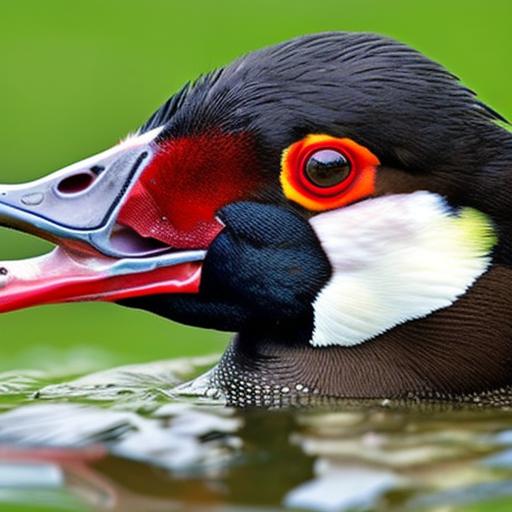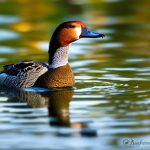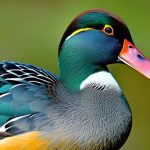Muscovy ducks, also known as Cairina moschata, are native to South America and have a long history of domestication. They were first brought to Europe by Spanish explorers in the 16th century and have since spread to various parts of the world. Muscovy ducks are known for their unique appearance, with males having a distinctive red face and warty growths around their eyes. They are also larger than most other duck breeds, making them a popular choice for meat production.
Breeding Muscovy ducks can be a rewarding endeavor for both hobbyists and commercial breeders. These ducks are known for their excellent meat quality, with lean and flavorful meat that is often compared to that of a turkey. Additionally, Muscovy ducks are prolific layers, with females capable of producing up to 100 eggs per year. This makes them an ideal choice for those looking to produce both meat and eggs.
Key Takeaways
- Muscovy duck breeding requires careful selection of breeding stock and understanding of their reproductive behaviors.
- Creating an ideal breeding environment and providing proper nutrition are crucial for successful breeding.
- Managing breeding cycles and hatching and rearing ducklings require attention to detail and proper health management.
- Muscovy ducks can be marketed and sold for their meat, eggs, and feathers, and breeding for conservation and sustainability is important.
- Overall, successful Muscovy duck breeding requires knowledge, patience, and dedication to the process.
Selecting the Right Breeding Stock for Muscovy Ducks
When it comes to breeding Muscovy ducks, selecting the right breeding stock is crucial. It is important to choose ducks that exhibit desirable traits such as good conformation, strong fertility, and excellent mothering abilities. Look for ducks that have a well-rounded body shape, strong legs, and a healthy appearance. Avoid ducks that are too small or have any physical deformities.
Finding quality breeding stock can be done through various sources. Local breeders or hatcheries specializing in Muscovy ducks are a good place to start. They can provide you with healthy and well-bred ducks that meet your specific requirements. Online forums and classified ads can also be helpful in finding reputable breeders who have a good reputation for producing high-quality stock.
Understanding Muscovy Duck Reproduction and Mating Behaviors
Muscovy duck reproduction is quite different from that of other duck breeds. Unlike most ducks, Muscovy ducks have a longer mating season that can last up to 8 months. During this time, males will engage in elaborate courtship displays to attract females. These displays often involve head bobbing, wing flapping, and hissing sounds.
Once a pair has formed, they will engage in mating behaviors such as mounting and copulation. Mating can occur both on land and in water, with the male grasping the female’s neck with his bill during copulation. After mating, the female will lay a clutch of eggs in a nest she has built.
Creating the Ideal Breeding Environment for Muscovy Ducks
Creating the ideal breeding environment for Muscovy ducks is essential for successful breeding. Muscovy ducks require ample space to roam and access to water for bathing and swimming. A large, secure enclosure is necessary to protect them from predators and provide them with a safe space to breed.
When it comes to nesting materials and locations, Muscovy ducks prefer secluded areas with plenty of vegetation. Provide them with nesting boxes or platforms filled with straw or wood shavings for them to build their nests. It is important to regularly clean and replace nesting materials to maintain a clean and hygienic environment.
Nutritional Requirements for Muscovy Duck Breeding
Proper nutrition is crucial for breeding Muscovy ducks. A well-balanced diet will ensure that ducks are healthy and capable of producing high-quality eggs and offspring. A diet consisting of a commercial poultry feed formulated specifically for ducks is recommended. This feed should contain a balance of protein, carbohydrates, vitamins, and minerals.
Supplements such as fresh fruits and vegetables can also be provided to enhance their diet. Ducks should have access to clean water at all times, as they require it for digestion and overall health. It is important to monitor their food intake and adjust their diet accordingly based on their breeding status.
Managing Muscovy Duck Breeding Cycles

Managing Muscovy duck breeding cycles is essential for maximizing egg production and fertility. Muscovy ducks have a natural breeding season that typically occurs during the spring and summer months. However, with proper management, they can be encouraged to breed year-round.
To stimulate breeding, provide ducks with a high-quality diet and ensure they have access to clean water. Monitor their behavior for signs of mating readiness, such as increased vocalization and courtship displays. It is also important to monitor egg production and fertility rates to ensure optimal breeding success.
Hatching and Rearing Muscovy Ducklings
Hatching and rearing Muscovy ducklings can be an exciting and rewarding experience. Muscovy ducks are excellent mothers and will diligently care for their young. However, it is important to provide them with a safe and comfortable environment for hatching and rearing.
If you are interested in hatching ducklings naturally, provide the female with a suitable nesting area and allow her to incubate the eggs. This process typically takes around 35 days. Once the ducklings hatch, they should be kept in a warm and dry brooder with access to food and water.
Health and Disease Management in Muscovy Duck Breeding
Maintaining the health of your Muscovy ducks is crucial for successful breeding. Like any other livestock, Muscovy ducks are susceptible to various diseases and health issues. Common health issues in Muscovy ducks include respiratory infections, parasites, and nutritional deficiencies.
To prevent these issues, it is important to provide ducks with a clean and sanitary environment. Regularly clean their housing and provide them with fresh bedding materials. Additionally, ensure that ducks receive proper nutrition through a balanced diet and access to clean water.
Marketing and Selling Muscovy Ducks and Products
Once you have successfully bred Muscovy ducks, you may consider marketing and selling them and their products. Live ducks can be sold to other breeders or individuals looking to raise ducks for meat or eggs. Processed products such as duck meat, eggs, and feathers can also be sold to local markets or restaurants.
To find markets for Muscovy duck products, reach out to local farmers’ markets, restaurants, and specialty food stores. You can also consider selling products online through platforms such as Etsy or your own website. Building relationships with potential customers and promoting the unique qualities of Muscovy duck products can help increase sales.
Breeding Muscovy Ducks for Conservation and Sustainability
Breeding Muscovy ducks not only provides economic opportunities but also contributes to conservation efforts. Muscovy ducks are considered a threatened species in their native habitat due to habitat loss and hunting. By breeding Muscovy ducks, you are helping to conserve the genetic diversity of the species and ensure its survival.
Sustainable breeding practices such as maintaining genetic diversity, promoting natural behaviors, and minimizing environmental impact are important for the long-term sustainability of Muscovy duck breeding. By implementing these practices, you can contribute to the conservation of this unique and valuable breed.
In conclusion, breeding Muscovy ducks can be a rewarding and profitable venture with the right knowledge and resources. By selecting the right breeding stock, understanding their reproductive behaviors, creating an ideal breeding environment, providing proper nutrition, managing breeding cycles, hatching and rearing ducklings, managing health and disease, marketing and selling products, and practicing sustainable breeding methods, you can successfully breed and raise Muscovy ducks while contributing to conservation efforts.
If you’re interested in muscovy duck breeding, you might also find this article on the incubation period for goose eggs helpful. Understanding the incubation process is crucial for successful breeding, and this article from Poultry Wizard provides valuable insights. Check it out here. For more information on poultry breeding, tips, and resources, visit Poultry Wizard’s website at https://poultrywizard.com. Additionally, if you’re looking for ideas on creating a cozy and functional chicken coop, don’t miss their article on the Chicken Coop Country Diner here. Happy reading and happy breeding!
FAQs
What is a Muscovy duck?
A Muscovy duck is a large domesticated duck breed that is native to South and Central America. They are known for their unique appearance, with a red, warty face and a black and white plumage.
How do you breed Muscovy ducks?
Muscovy ducks are bred through natural mating. The male will mount the female and fertilize her eggs. It is important to provide a suitable nesting area for the female to lay her eggs and incubate them.
What is the incubation period for Muscovy duck eggs?
The incubation period for Muscovy duck eggs is approximately 35 days. During this time, the eggs must be kept at a constant temperature and humidity level to ensure proper development.
How many eggs do Muscovy ducks lay?
Muscovy ducks typically lay between 8-16 eggs per clutch. They may lay multiple clutches per breeding season.
What is the lifespan of a Muscovy duck?
The lifespan of a Muscovy duck is typically 8-12 years.
What is the average weight of a Muscovy duck?
The average weight of a Muscovy duck is between 6-10 pounds.
What is the purpose of breeding Muscovy ducks?
Muscovy ducks are bred for their meat, eggs, and feathers. They are also kept as pets and for exhibition purposes.
What are some common health issues that Muscovy ducks may face?
Muscovy ducks may be susceptible to respiratory infections, parasites, and injuries from predators. It is important to provide them with proper nutrition, housing, and veterinary care to prevent and treat these issues.
Meet Walter, the feathered-friend fanatic of Florida! Nestled in the sunshine state, Walter struts through life with his feathered companions, clucking his way to happiness. With a coop that’s fancier than a five-star hotel, he’s the Don Juan of the chicken world. When he’s not teaching his hens to do the cha-cha, you’ll find him in a heated debate with his prized rooster, Sir Clucks-a-Lot. Walter’s poultry passion is no yolk; he’s the sunny-side-up guy you never knew you needed in your flock of friends!







